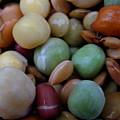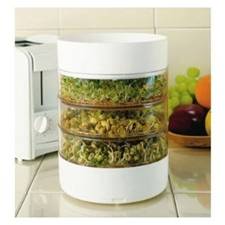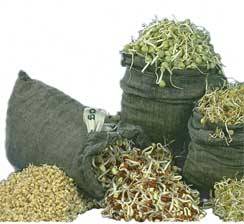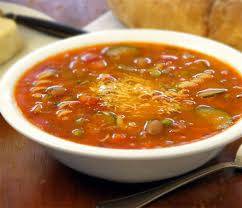
|
Do You Sprout?
by Alice Osborne
 I was reading one of my favorite blogs recently, mixedgreensblogspot.com, and the talk was about sprouts. The author reminded us that pretty soon the fresh greens from the garden will be but a memory, and it’ll be time to pull out the sprouter and start a crop of sprouts — talk about practically-instant-gratification. In just 2 – 4 days, you can grow enough to sprinkle on just about anything.
 Sprouts used to be synonymous with “health food” during the natural foods movement of the 70’s — especially alfalfa sprouts. Now they’re pretty much mainstream. During the process of germination, seeds and grains produce vitamins (especially C) and numerous enzymes helpful in digestion and absorption of minerals. Almost any seed, bean or grain can be sprouted. All good reasons why sprouting has become so popular.
 Surprisingly though, one seed NOT recommended for sprouting, by Sally Fallon in one my very favorite cookbooks, Nourishing Traditions, (a cookbook that “challenges politically correct nutrition”), is alfalfa. Fallon believes that alfalfa sprouts can actually compromise the immune system. That’s OK, broccoli sprouts taste even better. If you haven’t tried broccoli sprouts, do so—they’re a little spicy and really add a nice zest to salads. Also give mung beans and sunflower seeds a shot. Most bulk food sections in health food stores carry sprouting seeds, but wherever you get your seeds, make certain they are organic.
 Over the years I’ve use a quart glass jar and piece of nylon stocking to grow my sprouts, which worked so-so. There are better options out there, though. This 3-tiered sprouter is nice—you can watch them grow, they grow upright and they’re super easy to rinse when growing in this configuration.
 Another sprouting method is the sprout bag, made of 100% raw hemp for extra durability. Sprout bags will grow any seed, but they're perfect for all grains and beans including mung, lentil, garbanzo, adzuki, wheat, barley, rye, kamut, peanut, quinoa, cress, arugula, fenugreek, and more. Just dip and hang! Here are a few reasons why a sprout bag is preferable over other methods:
Saves time. Very convenient.
All sprouts get air. Good circulation prevents mold.
100% drainage without tilting or waiting. Water never collects.
Will sprout all varieties. All grains, all beans, even gelatinous seeds.
Convenient. Only 2 steps. Dip in water, hang on hook or knob. Or lay in dish rack.
Saves counter space. Saves refrigerator space. Bags expand and contract per volume.
Lightweight, unbreakable. Great for traveling, camping, boating.
Wide opening for easy handling. Holds equivalent to 3/4 gallon jar.
Fabric won't shrink or mold, like cotton, burlap or cheesecloth.
The only drawback I see is the price - $34.95 for this baby. BUT, it’ll last forever. The man that invented it, Steve Meyerowitz (the Sproutman), is still using the one he made in 1979! I like the super convenience. The older I get, the easier I want things to be. So if the sprout bag interests you, check it out at his site, https://sproutman.com/sprouters/3-bag-special-natural-hemp-sprout-bags?zenid=a224e40d6c7596019275fc08e4f9170c.
There are lots and lots of good how-to books on the subject as well, along with great recipes. Here are a couple I really like:
Sprout Hummus
 1 cup garbanzo bean sprouts 1 cup garbanzo bean sprouts
1 Tbs. tahini
1 Tbs. lemon juice
1 Tsp. olive oil
1 clove garlic (more or less - to taste)
1 tsp. ground cumin
1/2 tsp. salt
1/2 tsp. ground white pepper
Mix all ingredients to desired consistency using a food processor.
Serve: Spread hummus on serving platter drizzle olive oil + sprinkle paprika over top. Slice cucumber, tomatoes, carrots, etc. and place around hummus.
Or, spread Hummus on flour tortilla, top with other sprouts. Roll it up. Serve whole or sliced.
 Download this recipe.
Minestrone
Serves 6 Download this recipe.
Minestrone
Serves 6
 1/2 cup cabbage - chopped
2 potatoes - cut into small cubes
1 or 2 carrots cut nicely
1 onion - diced
1 cup spinach - chopped
1 summer squash - chopped
4 cups sprouted beans
1 cup pasta - your choice
1 quart tomato puree or vegetable stock
1/2 cup olive oil
1 tsp. oregano
1 tsp. basil
1 Tbs. parsley
4 cloves garlic - chopped
salt to taste
Parmesan or Romano cheese – optional
In a big pot combine the sprouted beans, veggies, pasta and tomato puree or stock. Bring to a boil then reduce to a simmer. - cook 15-20 minutes, until tender. Make a paste of the oil, garlic, and herbs using a mortar & pestle, blender or food processor. Top the soup with this paste and some parmesan or romano cheese.
 Download this recipe.
Whole Grain Sprouted Bread
Grains to use: Kamut, Quinoa, Rye, Spelt, Wheat, Triticale Download this recipe.
Whole Grain Sprouted Bread
Grains to use: Kamut, Quinoa, Rye, Spelt, Wheat, Triticale
 To soften yeast - combine in a large bowl:
2 1/2 cups warm water
2 scant Tbs. active dry yeast
Allow the yeast to proof (bubble) for 5 minutes
Stir in:
1/2 cup oil
1/2 cup honey
1 Tbs. salt
2 Cups Sprouted Grains - whole or ground lightly
4 cups flour (any combo of wheat, rye and white you like) Beat well. Cover and let this “sponge” sit 45-60 minutes.
Stir down and gradually add:
3-4 cups flour (any combination)
Turn dough out onto a lightly floured surface and knead until smooth. Place dough into a greased bowl - turn it over and around to coat the whole of the dough. Cover and let rise until doubled (60-90 minutes).
Knead dough down in the bowl, divide and shape into 2 - 3 oblong loaves. Place in well greased loaf pans and cover. Let rise 60 minutes or until almost doubled. Bake at 375º for 35 to 40 minutes. Remove loaves from pans and cool on wire racks.
Notes: Mix and match grain sprouts to your heart's content. When using whole wheat and/or rye flours you might add wheat gluten - at a rate of 1/8 cup per cup of flour - as it often produces a nicer loaf.
Contribute to the Cook'n Club!
DVO would love to publish your article, prose, photography and art as well as your cooking, kitchen and nutrition tips, tricks and secrets. Visit the Newsletter Submission / Win Win for All section in our Forum for more information and details.
|
|



